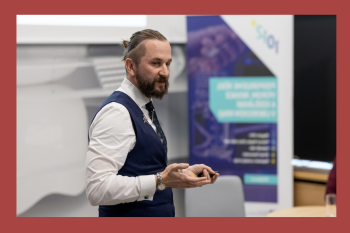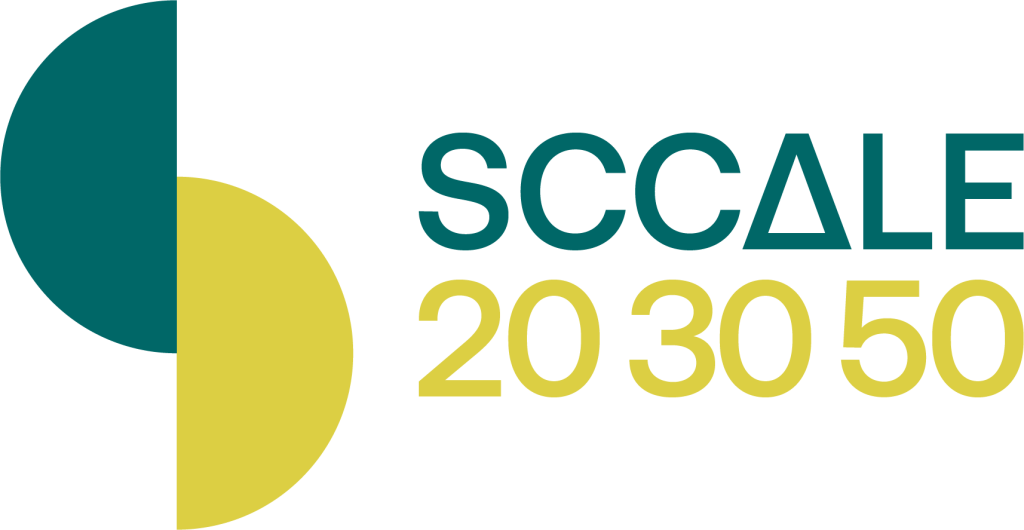“Now we have a great chance to take over a part of the world, where we used to be slaves.”
Interview with Michal Svoboda, Sustainable Energy Consultant


He is an ultra-runner and an ultra-communicator. When Michal Svoboda talks to Mayors about new energy practices he demonstrates both, endurance and creativity. This Czechman who used to work for the leading big energy company is now a fervent advocate of local renewable energy. Michal is an energy consultant and involved in several municipal networks. He also participated in the recent creation of the very first Czech Union for energy communities UKEN. I’ve talked with him about the challenge to make sure renewables are not monopolized by large big investors, the changes it requires to initiate collective energy action in a post-communist country and in areas with a deeply entrenched coal culture.
Energy Cities
Michal, hi, welcome to City Stories, it’s great to have you on the show.
Michal
Hello, Miriam. Thank you for having me.
Energy Cities
What did you most think about today?
Michal
It’s not anything super important, but yeah, it’s kind of cool. I’m writing a local energy concept of one very small village here in the mountains. And even though we have never heard about a village, I really want to make this work quite perfect. So it’s a real intent to have a really good example of a village in the hall of forgotten land, that has a perfect energy consumption. And that has actually made a couple of really important steps in terms of energy efficiency and energy sustainability.
Energy Cities
Great, so that probably leads us to actually your job life, because I guess this is what you did in terms of job missions, Can you tell us a bit more about what your mission or different missions consist of?
Michal
Well, I’m working with small municipalities across the country. I’m located in the West of the Czech Republic, so I’m helping part of the smaller municipalities to develop their own strategies, to implement energy management schemes to be more energy efficient and at the end of the day to build their own energy sources.
But also, I’m consulting across the country. Like I’m trying to help the mayors and the local authorities find the correct way how to be as much independent in terms of energies as possible in the future.
And I mean the Czech Republic is quite small, but it’s also a very centralized country.
Energy Cities
So how big are the chances for municipalities or villages even to make a difference in the energy system? And if we go even further: to create energy communities?
Michal
It’s a great question actually. For me, the question starts, like how much do we actually want to be independent not only in terms of the country. This is something that’s been part of the Czech mentality, like we do not want to depend on anyone in basically anything.
The other thing is that the energy sector as much as anywhere else in Europe is now being run by the big corporations. And Czech Republic has a long lasting tradition of centralized energy before communism took part in this country.
And then, during the communism, the decentralization of the energy system was finished. And that job, it has to be said, was done very well. Like, we have a really good grid. We have really good means of production or whether it is nuclear or coal, power, plant. But that has changed, as anything else in the world is changing.
And now the question that we have is: It is no more needed that the resources are in the hands or in ownership of the big of corporations, whether it’s national or international corporations. Now we have a great chance to take over a part of the world, where we used to be – I’d call it – the refugees or slaves. Like, we can master some things, because the technology allows it. Like, anyone can have a small windmill, a small solar power plant. And basically, anyone, if you have a stable water supply, you can have a small water turbine. There’s plenty of options, biomass, et cetera.
There’s no question about switching to renewables, right? We will replace all our coal mining. We are 50% dependent on brown coal in the Czech Republic. No question. Maybe the question is: when? I always say 2030, if it’s 2040, I don’t care. It will happen. The very big question is: Who will be the owner of the renewables?
Energy Cities
That was something that I was wondering as well, because, I mean, we see many big investors coming into the renewables sector, and, I think far less kind of smaller players, so we can sometimes have the impression that big companies are of undermining the fair renewables transition.
And I know that you’ve been working for the private energy sector for quite some time. And I was wondering: Are there things and kind of methods or approaches that you can take from this experience and that you think would be useful for this more shared and community energy movement that we want to create?
Michal
Sure, you’re right I spent more than a decade for a leading energy producer and the provider in the Czech Republic. I was part of the broader management. So, I do know well the long-term strategy, which is happening. So this corporation, that in the moment runs most of the coal mines and most of the – whether nuclear or coal – power plants. They have this strategy: Perfectly replace the current, installed capacity in coal. They know that as soon as they will switch off the coal power plants, at the same time, they will switch on the renewables. So, they will do it. If we do nothing, they will just do it. But, it doesn’t have to be like that. We have a new legislation that is being applied this year.
Michal
And also, another good thing is that the municipalities that I work with, are actually not poor in the country. The major part of municipalities have relatively or considerably good income, and they also have means to build their own, or at least, to participate. Not, not necessarily own 100%, but participate on their resources.
So, there is a way and it is a way of keeping money in the region. If you if you do a national survey, and if you ask just a simple question, do you want your money to stay at the local level? Like most of the people will say yes. But then the question is, are you doing something for it, and are you doing something for that in the energy sector, which is among the richest sectors in our life, then the obvious answer is no. Why not? Because we don’t have the information yet. You know the technology is here, this is what I say. The money is here. The level of knowledge and the informational spread is not yet processed as much as
will be needed for the real change.
So, again, back to the origin was one of my real missions, is to spread the information. I started speaking about a particular project, because I find it very important that I’m not only speaking about what should be done, what the theory says. I wouldn’t have to do this, because if I chose to, I would be only a speaker, or coach in energy. But I freely choose to work on the real projects for, for real small villages, to have the real touch, and to transfer the practical knowledge to the country. So, the change is possible.
Energy Cities
And you’re even working in areas that are far from being renewable, because I think you’re living and working in the town that is located in the coal mining region, right?
This is really a very specific, economic, cultural, social context. What can we take from this very entrenched coal culture to build a new spirit, and to shift to shared renewable energy?
Michal
You know, I spent part of my life in big cities, in Amsterdam, Prague, London.So if you take it from the perspective of people living in those big centers of Europe, like you see it as a region of high unemployment rates, maybe lower incomes, social problems. But on the other hand, the people living in those regions, especially the coal mining position, they are much better paid than the rest of the jobs.
It is a stable job, meaning, like once you get it, as long as the coal mine is there, and if you do not do anything super wrong, you will keep this job. In terms of municipalities, if your village or town is located in a coal mining, it means compensation money for you. So, by the law that the State is supposed to compensate. And the richest villages in the country are actually the coal mining villages.
So, if you have a coal mine and a waste disposal then you can be a really rich.
So say that at the very beginning, you said, the Czech people rather have this mentality of wanting to not depend on anybody or anything.
Energy Cities
So I guess those compensations are probably not really very much in line with with this
Michal
In terms of those coal mining regions: If you put the question, then originally everybody would say yes, we want to be independent. But then, if you go deep and say: But do you actually realize that you are mostly dependent on those state subsidies? Are you willing to do something about it?
No, no. It’s maybe more about feeling safe then the laziness. Like, what do we take of these people, like, talking about renewables, green deals, and stuff like that, is we take their safety, we are stealing their safety, and that’s why, in the coal mining regions, they do not perceive this change well.
Now, if you ask me, even though I’m coming from the coal mining region, even though I’m working with the way the villages and towns here, I really expect the change to happen faster in the non-coal mining regions where the people are more prone to this entrepreneurial mindset and more able to take care of themselves.
Energy Cities
Is that a matter of generation, as well, and the need for the next generation to come in, maybe also the next generation of policymakers, local policymakers, to be more open to this new way of producing energy?
Michal
I believe so, as the younger generation speaks, a language, that younger generation nowadays means people in their forties, fifties, right? So, this younger generation is able to speak and read in English. So, they are not dependent on the translated sources in national languages.
Those people traveled the world like nowadays, this is a very common to visit the international conferences, international idea exchange, just like we there’s so many options as a mayor. As a Mayor of small town nowadays, you have so many options to join excursions to wherever you wish to France, Germany, Austria, to see the projects that are really inspirational.
If we come back to the coal mining regions, the reality is: most of the time, the villages are run by over-aged men, like it or another, is, a man is not gender equal situation men in their sixties, sometimes even the early seventies. And those men, I often very much respect them, because they did a tremendous job, keeping their locality safe all the time. And they have very strong positions in their communities. But knowing that I’ve been doing something well for 50 years, makes me believe I will do it forever. and I’m like, who are you to tell me that that something is changing? I’ve been here for so long. So as you said, I’m really afraid that a generational change will be needed here, because you don’t move these people.
Energy Cities
And if we move away from those coal regions, and rather towards the local authorities that you were mentioning, which are probably return, maybe also more open to change, and so you’re meeting with Mayor as a regular basis. When I imagine your job, I guess it’s very satisfying to be oneself driver of change at the local level, trying to convince those local decision makers, but how often do you really see change happen?
Michal
I do, I do. First of all, if I compare it with the mind and the decade of working for the corporation, I really felt burnt out. The change is actually happening. And sometimes I use the unicorn expression like when we started talking about energy communities and renewable energy, we had great expectations: We thought 2025 we will have replace all the coal mines with solar power plants on our roofs. Then we started calculating it and said, this is absolutely impossible.
It’s just crazy.
If you ask a random mayor in this country, how much you pay, per annum, on energy. He doesn’t know. He will have to call the accountant to look into the bills. If you ask, in terms of months, how much do you pay monthly? Like, does it make sense for you to build, rather a summer independent energy sources like photovoltaics or rather winter dependent such as wind energy, nobody knows. We don’t have the data. And we started collecting the data. We started doing the small steps.
Yes, we are still depending on the brown coal. I’m really happy for each of the villages. So, when I switched my mind from expecting the big goal to happen immediately, and I started being happy for these small steps, I really feel satisfied.
I really feel like we are doing a good job here.
Energy Cities
That’s really great to hear. And in addition to this consulting job, you’re also co-founder of the very first Czech Union of Energy Communities. Where does energy community stand in Czech Republic?
Michal
So, it is not me, personally, who was the co-founder, but the organization that I represent is the Association of Small Municipalities, which is one of the four founding I was …, is not my achievements, the organizational achievement among the four founders of the Union of Community Energy. This is, by the way, one of the big steps that they did, I’m happy for that we accomplished. It is a transparent, lobbying organization.
Michal
From the corporation, I knew, well, how much the clear and perfectly transparent lobbying takes place in all bureaucratic and political decision-making processes. I, being an employee of the big corporation, took part in very important decision-making processes. At that time nobody, literally, nobody from representing the other side was there. So, this is the first time we have a strong, nationally acknowledged organization that actually made it to be able to comment any law that’s being processed by the Parliament. Any directive that’s being gotten through the energy regulatory office. We might not have the power to change, but at least we have the voice. Like, we are being heard. Often it happens that we are voted out. But we are already there and the opinion is heard. And for the bureaucrats they didn’t do a bad job in listening to the corporations. Especially because the people on the side of corporations, they are really well educated. And well, they are right. But, that is just their perspective. You can be right and you can have another opinion. So, for the bureaucrats and for the people who are actually responsible for laws, it is really enriching to have a relevant partner on the other side. And this Union of community energy, has acquired such a role.
Energy Cities
I think it’s amazing that you’ve managed to set this up. So, congratulations already just for creating this organization and let us hope that it’s going to stay an impactful organization in the Czech policy field. Is there a final thought that you would want to leave to our listeners, Michal?
Michal
I think we all would learn to be happy. It took me a long time to process to be happy for those little steps. Put your hand to your heart if you’re not sometimes frustrated from the change that is happening, maybe slowly. But really, I encourage everybody. It, has helped me, personally, very, very much, to look at the small goals and the small processes that are actually happening. And we all will be more satisfied, and motivated to do our jobs, and the change will actually happen. Thank you so much for taking the time and, well, even more for being such a great voice for, for local Democratic energy, not only getting Tech Republic, but now, also, at least through this podcast elsewhere in Europe.
Energy Cities
We hope that your Energy Communities Union well, have impact really in the country, and hopefully will inspire some others and other Central and Eastern European countries and do, well. Please keep up the very good work that you do with Mayors. We need their commitment in the first place to make things happen at local level.
Michal
Thanks for having me. It was a big honor and pleasure to talk to you.
Energy Cities
Thank you.

This episode was produced with support from SCCALE 20-30-50. SCCALE is an EU project (Horizon 2020 programme) which makes collaboration happen to get many more energy communities up and running. The people behind SCCALE203050 work on a methodology and toolkit for citizens, cities and policy makers. If you, too, want to see more local energy communities across Europe, check out the toolkit and explore all of the project’s resources at the website sccale203050.eu.



